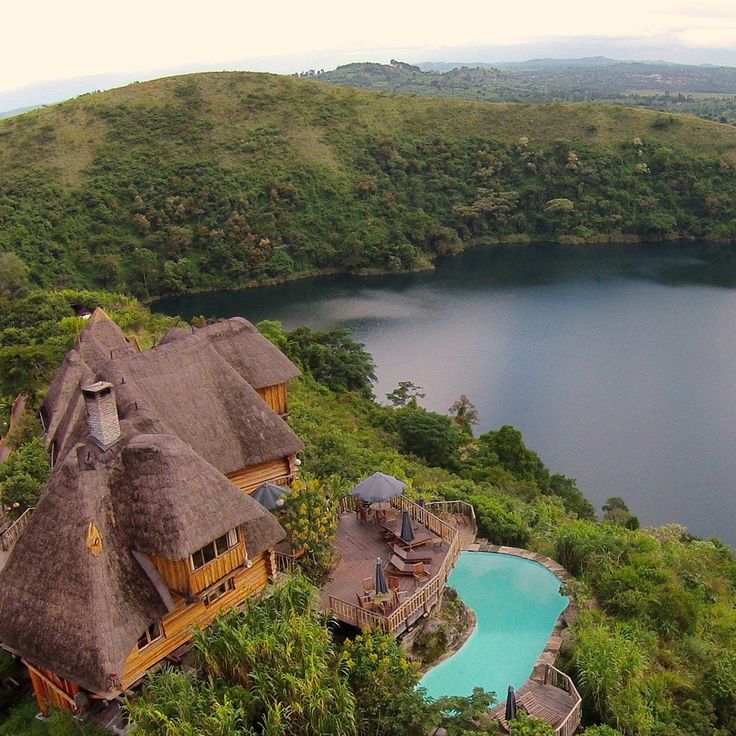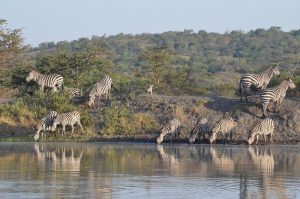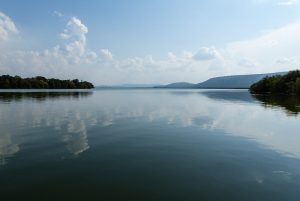Uganda, the Pearl of Africa, is not only blessed with breathtaking landscapes and rare wildlife but also a growing reputation for sustainable tourism. Eco lodges in Uganda have become the cornerstone of responsible travel, combining comfort with conservation. These lodges are designed to minimize environmental impact, support local communities, and give travelers an authentic experience in some of the country’s most pristine locations. Whether you are trekking gorillas in Bwindi, birdwatching in the Rwenzoris, or exploring Murchison Falls, Uganda’s eco lodges offer a unique way to connect with nature. Top Eco Lodges in Uganda
What are the best eco lodges in Uganda?
Uganda is home to a wide range of eco lodges, each located in unique landscapes. Some of the top eco lodges include:
- Kyaninga Lodge (Fort Portal) – A luxury eco lodge overlooking Kyaninga Crater Lake. Built entirely from hand-carved logs, it runs on sustainable practices and supports local projects for children with disabilities.
- Ndali Lodge (Fort Portal) – Famous for its crater lake views, Ndali Lodge uses organic farming and supports nearby communities while maintaining a low-impact environment.
- Apoka Safari Lodge (Kidepo Valley National Park) – Remote and wild, this eco lodge blends into the savannah while running eco-conscious operations and employing locals.
- Budongo Eco Lodge (Murchison Falls) – Set in the Budongo Forest Reserve, it supports chimpanzee conservation and reforestation initiatives.
- Rwenzori Turaco View Eco Lodge – Locally owned and community-driven, this lodge offers incredible views of the Rwenzori Mountains and supports rural development projects.
- Baker’s Lodge (Murchison Falls) – Located along the Nile River, it uses low-impact building materials and sustainable waste systems.
- Papaya Lake Lodge (near Kibale Forest) – Known for its stylish yet eco-friendly cottages, built from natural materials, surrounded by crater lakes.
These lodges not only provide comfort but also serve as models of sustainability in Uganda’s growing tourism industry. Top Eco Lodges in Uganda
What makes a lodge eco-friendly in Uganda?
An eco lodge in Uganda is designed to protect the natural environment while benefiting local communities. Key eco-friendly practices include:
- Sustainable Energy: Many lodges run on solar power and use energy-saving systems.
- Water Conservation: Rainwater harvesting, eco-friendly showers, and waste management systems are common.
- Local Sourcing: Food is often grown on-site through organic farming or sourced from nearby farmers.
- Wildlife Protection: Eco lodges avoid disrupting habitats and contribute to conservation programs.
- Community Involvement: Employment of locals, cultural tourism initiatives, and support for education or healthcare projects.
This balance of environmental care and community support is what distinguishes eco lodges from standard safari lodges.
Which eco lodges are near Bwindi Impenetrable Forest?
Bwindi is famous for gorilla trekking, and several eco lodges offer sustainable stays near the park:
- Buhoma Lodge – Just steps from the park entrance, it uses eco-friendly designs and offers breathtaking views of the forest canopy.
- Sanctuary Gorilla Forest Camp – A luxury tented eco lodge inside Bwindi that minimizes impact while supporting gorilla conservation.
- Clouds Mountain Gorilla Lodge – Built with natural materials, employing locals, and offering one of the closest access to gorilla trekking trails.
These eco lodges not only provide comfort but also allow travelers to experience gorilla trekking responsibly.
Are there eco lodges in Murchison Falls National Park?
Murchison Falls National Park, Uganda’s largest and most visited park, has several eco lodges:
- Budongo Eco Lodge – A research and conservation hub in addition to offering accommodation.
- Baker’s Lodge – A luxury eco lodge on the Nile, running on renewable energy and low-impact building materials.
- Pakuba Eco Lodge – Designed for affordability while maintaining eco-conscious operations.
These lodges offer opportunities to see elephants, giraffes, lions, hippos, and over 450 bird species while promoting sustainable tourism.
How much does it cost to stay in an eco lodge in Uganda?
The cost of eco lodges in Uganda varies based on location, luxury level, and included activities:
- Budget Eco Lodges: $50–$100 per night (simple bandas, community-owned lodges).
- Mid-range Eco Lodges: $100–$250 per night (stylish cottages, more comfort, partial inclusions).
- Luxury Eco Lodges: $250–$800+ per night (all-inclusive experiences, high-end service, luxury tents or cottages).
Prices often include meals, park fees, and guided activities. Gorilla trekking lodges near Bwindi tend to be more expensive due to exclusivity and limited permits. Top Eco Lodges in Uganda
Do eco lodges in Uganda support local communities?
Yes, almost all eco lodges in Uganda integrate community support into their operations. This includes:
- Employment: Most staff are recruited from nearby villages.
- Crafts and Cultural Tourism: Lodges showcase local crafts, dances, and storytelling to promote cultural heritage.
- Development Projects: Some lodges contribute to schools, health centers, and clean water initiatives.
For example, Rwenzori Turaco View Eco Lodge invests in rural community projects, while Kyaninga Lodge runs a foundation for children with disabilities. Top Eco Lodges in Uganda
Are eco lodges in Uganda suitable for families?
Eco lodges in Uganda cater to families by offering family-sized cottages, safe environments, and educational experiences for children. Some lodges provide nature walks, birdwatching activities, and cultural visits suitable for younger travelers. However, families should always confirm age restrictions for activities like gorilla trekking, which requires participants to be 15 years and older. Top Eco Lodges in Uganda
Which eco lodges in Uganda use solar power?
Many eco lodges in Uganda rely on solar energy to reduce their carbon footprint. Examples include:
- Ndali Lodge – Uses solar for lighting and hot water.
- Clouds Mountain Gorilla Lodge – Fully powered by solar energy.
- Rwenzori Turaco View Eco Lodge – Solar panels provide sustainable power for the entire lodge.
Solar power ensures eco lodges remain environmentally sustainable even in remote areas with no access to the national grid.
What wildlife can you see from eco lodges in Uganda?
Eco lodges in Uganda are strategically located in rich ecosystems, allowing guests to spot wildlife directly from their rooms or verandas. Depending on the lodge location, travelers may see:
- Bwindi Eco Lodges: Mountain gorillas, colobus monkeys, forest elephants.
- Murchison Falls Lodges: Hippos, elephants, lions, giraffes.
- Kidepo Lodges: Cheetahs, zebras, ostriches.
- Rwenzori Lodges: Unique bird species, monkeys, and stunning mountain views.
Many eco lodges double as wildlife-viewing platforms, offering guests immersive experiences without requiring them to leave their accommodations.
Do eco lodges in Uganda offer cultural experiences?
Cultural immersion is a core part of eco-lodges in Uganda. Guests can enjoy:
- Traditional dances and storytelling sessions.
- Visits to local farms, schools, and craft workshops.
- Community walks guided by village residents.
- Participation in cooking traditional Ugandan meals.
This approach gives travelers a chance to understand Uganda beyond its wildlife and supports the preservation of cultural heritage.
Are eco lodges in Uganda safe for international travelers?
Eco lodges in Uganda maintain high safety standards for international travelers. They provide:
- Secure environments with 24/7 staff presence.
- Health and hygiene measures, including purified drinking water.
- Trained guides for wildlife excursions.
- Coordination with national park authorities for security.
While eco lodges are often in remote areas, they prioritize guest safety without compromising the natural setting.
What is the difference between an eco lodge and a safari lodge in Uganda?
While both provide accommodation close to wildlife, the main difference lies in sustainability:
- Eco Lodges: Focus on minimizing environmental impact, using natural building materials, renewable energy, and community-based tourism.
- Safari Lodges: May prioritize luxury and convenience, sometimes with less emphasis on eco-friendly practices.
In Uganda, many safari lodges are now adopting eco principles, but true eco lodges go beyond comfort to prioritize conservation and community benefits.
Conclusion
Eco lodges in Uganda are more than just places to stay—they are gateways to sustainable exploration of one of Africa’s most biodiverse destinations. From gorilla trekking in Bwindi to wildlife safaris in Murchison Falls, these lodges ensure that travelers experience Uganda responsibly while supporting conservation and communities. Whether you are seeking luxury or budget-friendly stays, Uganda’s eco lodges offer unforgettable experiences that align with the values of sustainable travel.




